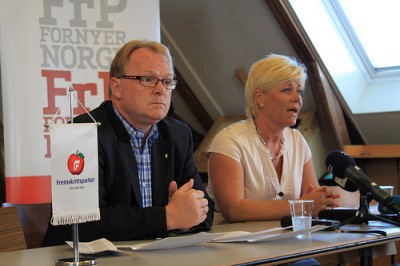The deputy leader of one of the two parties forming Norway’s government coalition declared on national radio Wednesday morning that his party may withdraw from the coalition, if presented with a demand to take in more Syrian refugees than the party can accept. Per Sandberg of the Progress Party said his party may well decide that it can’t be responsible for carrying out a demand it views as irresponsible.

Sandberg, taking part in Thursday morning’s live debate on state broadcaster NRK’s Politisk Kvarter program, said it would present “a huge challenge” if the other parties in parliament agree to increase the number of UN-registered refugees before allocating funds to cover the costs involved.
“We’re talking about costs of (at least) NOK 2 billion a year for 10 years,” Sandberg said. “We have to see what the demand will be, and then it will be up to the party’s national board to decide whether it will still be responsible for us to sit (in the government) and administer it.”
Asked what would happen if the Progress Party’s board decides it’s not, Sandberg said either the party will register its dissent or the government (led by Prime Minister Erna Solberg of the Conservatives) could call for a vote of confidence (kabinettspørsmål) in parliament, which it likely would lose. Solberg’s coalition already lacks a majority in parliament, leaving it in a situation that could lead to Labour forming a new coalition and taking over.
“There are many solutions,” Sandberg said. “Everything depends on what and which measure Labour pushes through.” All the political parties represented in parliament had been negotiating an exact refugee number until Friday, when the Progress Party pulled out of the negotiations, claiming it simply couldn’t go along with any of the proposals then on the table.
Ministerial dilemma
The biggest, and most uncomfortable, dilemma facing the Progress Party is that it currently runs the key ministries that would have to administer whatever the parliament decides on the refugee issue. Finance Minister Siv Jensen, leader of the Progress Party, would need to allocate the billions needed to finance an influx of refugees, Justice Minister Anders Anundsen would need to oversee the legal implications of such mass immigration, Integration Minister Solveig Horne would need to find homes for all the refugees and Labour Minister Robert Eriksson would need to help them find jobs. It would be very difficult politically for them to carry out such work if they don’t support it.
The thorny refugee issue has been hanging over the minority government since early this year, when both of its two support parties in parliament called for Norway to accept 10,000 additional refugees from Syria, in addition to the more than 5,000 refugees already approved but still waiting for settlement. Labour also voted at its national annual meeting this spring to accept 10,000, “5,000 this year and 5,000 next year,” declared Labour leader Jonas Gahr Støre. The other small parties in Parliament also support taking in at least 10,000 more Syrian refugees, so it became clear that a majority in parliament backed the proposal.
The government coalition, backed by several experts on refugee issues, has argued that it would be far more effective to send more financial aid to help refugees “where they are.” Arnulf Torbjørnsen, one of Norway’s most experienced refugee workers who spent 20 years with the Red Cross and 10 years with the UN, told NRK last week that assistance administered locally was far better than moving refugees far from their homes. “You don’t need a calculator to understand that you can help 100,000 more people than the 10,000 who may come to Norway,” Torbjørnsen, who also led Leger Uten Grenser (the local chapter of Doctors Without Borders), said it also was easier to help them return home when a conflict ends if they haven’t been relocated.
Opposition rolls out the welcome mat
Such reasoning seems to have fallen on deaf ears within the Labour, Liberals, Christian Democrats, Socialist Left (SV) and other parties keen to welcome more refugees to Norway. They also have fended off complaints from local municipalities, many of which are run by their own party fellows, that they lack capacity and resources to accommodate more than 15,000 refugees – the 5,000-plus already in Norway and the 10,000 additional Labour and the others want to accept.
Opposition leaders, not least Støre of the Labour Party, have already had to give up on taking in 5,000 additional refugees from Syria this year, with the majority now expected to be spread over 2016 and 2017. They’ve also admitted that they’ll have to back away from the much-vaunted figure of 10,000, realizing it’s not realistic when municipalities are only offering to take in a fraction of that – 1,669 at last count.
As the party leaders gathered late Thursday morning for what’s expected to be a final round of negotiations, the question was how many more Syrian refugees ultimately will be welcomed, and whether the Progress Party can accept the decision. The goal is still for all parties in Parliament to unanimously stand behind a compromise figure. If it’s too low, parties like SV and the Greens say they won’t back it. If it’s too high, the conservative government coalition may fall apart and be replaced by a Labour-led coalition.
newsinenglish.no/Nina Berglund

